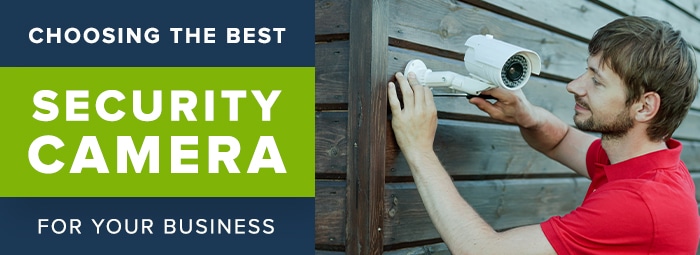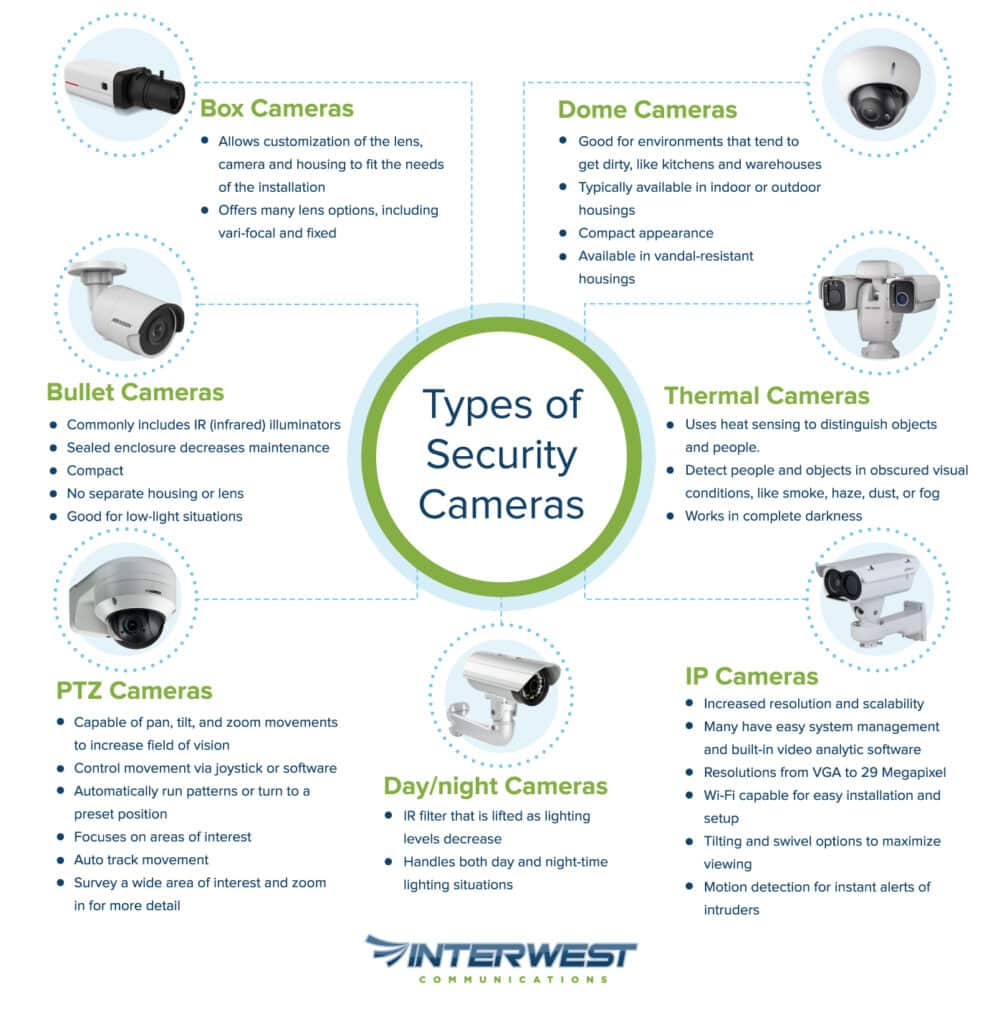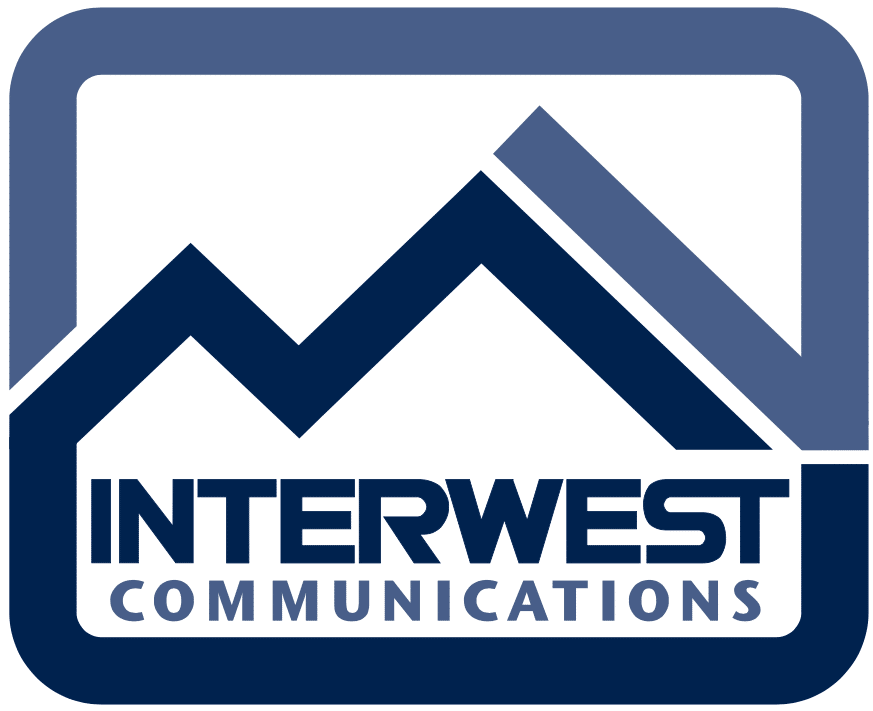- April 22, 2025
- Posted by: Interwest Communications Team
- Categories: News, Uncategorized

Originally posted on July 6, 2022 @ 8:11 pm

Security Cameras for Businesses
There are many factors when considering video surveillance systems and the cameras they use. Determining the type of cameras will depend on the amount of detail you need for monitoring, while also keeping scalability and accessibility in mind. There are many shapes and models of camera to choose from, with different capabilities depending on the conditions it will be in.

To Begin With: What are surveillance cameras?
Camera systems, or video surveillance, is the use of the internet or closed-circuit televisions (CCTV), and cameras to monitor premises. Cameras serve a vital function, preventing intrusion and alerting the organization of intrusion that’s taking place.
One of the benefits of video surveillance is that in the event that the security measures fail to prevent losses or damages, there will be a record and evidence of the events that took place, which makes resolving damages easier with authorities, insurance companies, and interested parties. Video surveillance systems are effective to protect physical property, assets, and people at any time, and are suitable for businesses of any size with physical properties to secure.
7 Considerations When Surveillance Camera Shopping
1. Surveillance Camera Resolution
Resolution is one of the most important considerations when choosing a camera. This is one of the most important considerations in selecting a camera. For a sharp image, you’ll want a camera that can shoot at least in 720p high definition, which usually means getting an IP camera.
Many security cameras can shoot in what is known as “low-light infrared,” enabling them to capture clear footage in dark conditions. These cameras use infrared light to cover a darkened area in infrared light. The camera can see this infrared light, so when those wavelengths reflect, it’s as if the camera is shooting footage in an illuminated room. The more IR LEDs a camera has, the better it can see at night. If capturing footage in the dark is a priority for you, make sure your camera has plenty of IR LEDs.
2. Surveillance Cameras with Audio
Whether audio recording is an option depends on the camera and the manufacturer. Some cameras don’t pick up audio at all, while others can record and store it. Some even enable two-way audio, so a person watching the camera can communicate with a subject in the camera’s field of vision. This live monitoring prevents intruders from finding and exploiting holes in the perimeters to gain unauthorized access. Even if someone has a key or code to open a door, the person monitoring the access points with cameras has a better chance of noticing if something isn’t right and preventing security breaches with an immediate response.
3. Surveillance Camera Wiring
Wired, Wireless, and Wire-Free are the different types of camera you have to select from in terms of power sources and connectivity.
Wired security cameras are the most traditional type of surveillance camera. Wired cameras are directly connected (wired) to a recorder which connects to your router and the internet. Depending on the wired security camera, it may also require a separate power cable. Wired cameras need to be connected to a DVR or NVR recorder to store and view the security footage.
A common misconception is that wireless also means it’s wire-free. Wireless security cameras still require a power cord.Wire-free cameras are battery powered security cameras that are 100% cable free. Wire-free security cameras are the easiest to install, and security footage is stored in the cloud. However, As battery operated cameras, the batteries will require charging.
4. IP Cameras vs. CCTV Analog Cameras
IP cameras are far more powerful than analog cameras, usually shooting footage of 1MP to 5MP. Analog footage runs around one-half of a megapixel. IP cameras generally have a larger field of vision than analog cameras.
- Resolution: IP cameras are far more powerful than CCTV cameras, usually shooting footage of 1MP to 5MP. CCTV footage runs around one-half of a megapixel.
- Field of view: IP cameras generally have a larger field of vision than CCTV cameras.
- Wi-Fi Connectivity: Wireless IP cameras can connect to a Wi-Fi network with password protection to make sure your connection stays private. Digital transmission for Wi-Fi-connected cameras is less easily affected by neighboring devices than transmission for CCTV cameras, but cameras in network-complex areas may experience some interference. Image quality is dependent on the strength of the wireless connection, so make sure your Wi-Fi signal is consistently strong if you go this route.
5. Surveillance Video Analytics
IP cameras have additional features that analog cameras don’t offer, such as video analytics, which can trigger mobile notifications and automatic recording if there is movement within the camera’s field of vision. This is useful when your business is closed and you want to be alerted if someone is moving around inside the premises.
You can configure the system to flag events like this and send notifications directly to your smartphone, along with recorded footage of the event. Some systems also offer a direct, one-touch connection to local law enforcement. This is important for businesses that have valuable assets on the property that are threatened by intruders without the involvement of law enforcement.
6. Surveillance Camera Wi-Fi Connectivity
Wireless IP cameras can connect to a Wi-Fi network with password protection to make sure your connection stays private. Digital transmission for Wi-Fi-connected cameras is less easily affected by neighboring devices than transmission for analog cameras, but cameras in network-complex areas may experience some interference. Image quality is dependent on the strength of the wireless connection, so make sure your Wi-Fi signal is consistently strong if you go this route.
7. Surveillance Camera Cost
While IP cameras are generally more expensive than their analog counterparts, the total cost of a full IP system tends to be slightly lower than that of a comparable analog system. Since IP cameras have a wider field of vision, an IP system can often work with fewer cameras than an analog system. In addition to the type of camera, you always want to consider the number of cameras your business needs as well as the best strategic location for the best field of vision with the fewest number of cameras. The efficient use of cameras means you can protect your property without overspending on too many cameras.
Surveillance Video Recorder
All the cameras in a given system require a central video recorder to transmit and archive the footage they capture. Access control systems can be integrated with either CCTV (analog) cameras or IP cameras.
The recorder is what stores all of the camera data. When choosing one, it’s important to ask yourself questions about storage capacity, the number of cameras in your system, each camera’s resolution, the amount of archived footage you intend to store, and how long you plan to keep recorded footage.
4 Common Types of Surveillance Video Recorders
If you have many cameras shooting in high resolution, the footage is going to quickly eat up storage space. You can set a video recorder to overwrite the oldest footage once you reach a specified capacity, but the system could overwrite archived footage that you still need. If you’re running a large system with high-quality cameras, you’ll want to scale up your video recorder’s storage capacity.
1. NVR (Network Video Recorders)
These cameras record higher-quality video and allow systems to scale up much more easily than with DVR. NVRs can record in 1080p, which is high definition, and a significant improvement in video quality over the DVR system. IP cameras are compatible with network video recorders (NVRs), which offer several other benefits over the older digital video recorders (DVRs) .
IP cameras are compatible with network video recorders (NVRs), which offer several other benefits over the older digital video recorders (DVRs) that this guide will cover. In short, NVRs record higher-quality video and allow systems to scale up much more easily than with DVR. For more information on video recorders, see the section below.
2. DVR (Digital Video Recorder)
DVR evolved from the older VCR models, while NVRs represent the next step in the evolution of video recording technology. DVRs generally offer D1 resolution, which is the traditional video quality used in closed-circuit television systems. D1 equates to a resolution of 720 x 480 pixels, which is considered standard resolution.
3. HVR (Hybrid Video Recorders)
Hybrid video recorders (HVR) are video surveillance systems that run both IP and CCTV cameras. They have the benefit of being versatile, and if you’re upgrading an old system and don’t want to do away with all of your old CCTV cameras, for example, an HVR can help you make the transition and prepare for a fully IP system in the future.
HVR systems have more components, therefore can be more complicated and difficult to manage. Integrating an access control system with a camera system with an HVR makes it easier to manage the components of the security system, which miss errors and gaps are less likely to happen and easier to manage if they do.
4. VMS (Video Management Software)
Video management software is a key component for integrated access control camera systems, because it is what controls video recording, retrieval, and display, as well as sensors, alarms, RFID readers, and other security system components.
VMS can be installed on DVRs and NVRs, but it can also be its own recorder for IP cameras, and is usually included with integrated access control camera systems. This type of software is only compatible with Windows operating systems, and only IP cameras, not CCTV.
Which video surveillance system is best for my business?
The important details when selecting a video surveillance system for your business’s security system are considering the cost and the scalability in comparison to the value of your physical property.
Larger organizations with more valuable assets on a property can usually afford the multiple high quality cameras, whereas a smaller business with smaller or fewer facilities that may not be able to afford as many cameras, actually only need the few cameras they can afford.
Interwest for Your Business Security Needs
Video surveillance and network security are equally as important to your business as the phone, networking, and cloud services that they protect and your business relies on. Connect with us to find out how Interwest Communications can help your business thrive.
